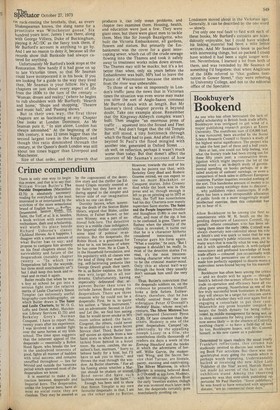Crime compendium
There is only one way to begin this review, and that is to say that William Vivian Butler's The Durable Desperadoes (Macmillan £2.75) is absolutely necessary reading for everyhody in the least interested in or entertained by the activities of the more sensational brand of English hero — Rnfflpc Drummond, Sexton.. Bialts,., Mee Saint, the Toff, et al. It is, besides, a book written with enormous enthusiasm, dash and scholarship, well worth its place beside Richard Usborne's classic Clubland Heroes. As it happens, I disagree with a certain amount of what Butler has to say; and propose to castigate him severely on his final chapters about the survivability and future of the desperadoes (notably chapter twenty — "In which two Desperadoes fall by the wayside, but three stroll nonchalantly on"): but I shall keep this book and re
read and re-read it again.
Butler recalls that when he was a boy at school he got into a serious fight over the relative merits of Leslie Charteris's Simon Templar (an extremely useful biography-cum-bibliography, on which Butler draws is The Saint and Leslie Charteris, by W. 0. G. Lofts and Derek Adley, Hutchinson Library Services £1.75) and Berkeley Grey's Norman Conquest. I have to report that, twenty years after his experience, I was involved in a similar fight over the same heroes at my Irish school. The time span suggests that the inherent appeal of the desperado — essentially a Robin Hood figure, who breaks the law in the undoubted interests of good, fights all manner of baddies with total success, and remains unruffled throughout — lies far beyond and outside the 'twenties period which spawned most of the desperadoes we know.
It is essential to make a distinction between desperado and Imperial .hero. The desperados, unlike the Imperial hero, have almost no social roots: they are classless. They may be sneered at by the cognoscenti of the detective story and the thriller (as Edmund Crispin recently sneered at the Saint) but they have an enduring appeal to the simpler and better side of our imagination which no one can deny.
Dorothy Sayers, when lamenting the death of the Sexton Blake library, argued that Blake, unlike Holmes, or Father Brown, or her own Wimsey, was a part of national folk-lore. The detective story is a middle class indulgence, the Imperial thriller conceivably some kind of political re-assurance. But the desperado, the Robin Hood, is a gentleman for what he is, not because of where he has come from. He is Class X, in the Household formulation, and • his popularity with all classes was the kind of thing that made boring, self-lacerating pedants like George Orwell gnash their teeth. He is, as Butler explains, the little man writ large: he is all our dreams. Unfortunately, having impeccably delineated that argument Butler then tries to Include James Bond among the desperadoes. There are three reasons why he could not be a desperado. First, he is, to quote his author, a "blunt instrument," not an adventurer. Second, in Live and Let Die, we find him noting that he would never smoke in M's room unless asked: the Saint, Congesst, the others, could never be so deferential to a mere Secret Service chief. Third, Butler himself quotes an episode from a late Saint story in which Simon is attacked from behind in a hotel room. He turns, catches, the assailant's foot, murmurs, "Sorry to behave badly for a host, but I'll have to ask you to leave," and throws the man through the window. As Butler observes. "For all his fussing about whether a Martini should be shaken or stirred. Bond never did have such faultless manners as the Saint." '
Enough has been said to show that Simon Templar is my own favourite desperado: in that, I am on the other side to Butler.
However, towards the end of his book he points out that, with Berkeley Grey dead and Roderic Graeme retired, we can expect to see no more Blackshirt or Conquest stories. John Creasey died while the book was in the press and so, though enough is left to go on printing up to 1975 at least, the Toff has nonetheless had his day. Charteris now merely supervises Saint stories. The Saint and the People Importers (Hodder and Stoughton E1.60) is one such effort, and most of the zip, it has to be confessed, is gone. There are flashes: when the identity of the villain is revealed, it turns out that he is a character hitherto
considered innocuous, an d Templar guys his form again. "What a surprise," he says, "But I suppose it shouldn't be, really. In most of the detective stories I've read, it's the most innocentlooking character who turns out to be the criminal master-mind. Only this at about half-way through the book they usually don't unmask him until the very end."
Thus, Butler's conviction that the desperado soldiers on. on the evidence he presents himself, looks a little forlorn. Extraor dinary, therefore, that he has wholly omitted from the consideration Peter O'Donnell's Modesty Blaise, whose new ;ad venture, The Silver Mistress has just appeared (Souvenir Press £2.20). Of later creation than the
others, Modesty is one of the great desperadoes. Camped up,
admittedly, by the appalling Joseph Losey in a film, she nonetheless thrills thousands of readers six days a week in the
Evening Standard and the books in which the adventures of her
self. Willie Garvin, the manser vant Weng, and the Secret Service chief Tarrant, are literate.
pacey, exciting and captivating.
The Silver Mistress, in which Jarrant is missing believed dead, is O'Donnell at top form. Modesty, with her entourage, derives from the early 'twenties stables, though she was invented much later: with her, the desperado certainly goes nonchalantly strolling on.


































 Previous page
Previous page